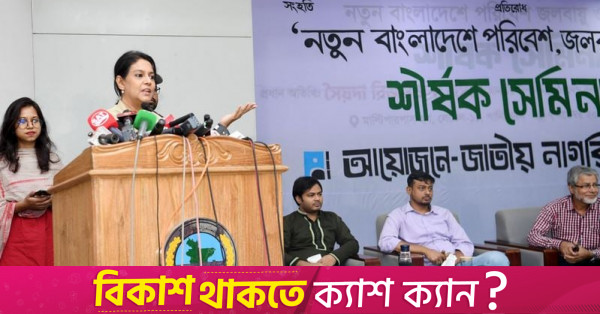A working group has been formed to free Dhaka canals
Adviser Syeda Rizwana Hasan speaking at a seminar on 7 Nov. Photo: BSS
“>

Adviser Syeda Rizwana Hasan speaking at a seminar on 7 Nov. Photo: BSS
Environment, Forest, Climate Change and Water Resources Adviser Syeda Rizwana Hasan said the government is placing the highest priority on environmental protection in its efforts to build a new Bangladesh.
She made these remarks as the chief guest at a seminar titled “Environment, Climate, and Politics in a New Bangladesh” at Pani Bhaban in Dhaka today.
The seminar featured discussions on environmental and climate challenges and opportunities throughout the country. The National Citizens Committee organised the event.
Rizwana Hasan said that a comprehensive plan is in progress to free Dhaka’s canals from encroachment and pollution. To achieve this, a working group has been established in collaboration with local government, water resources, land, and housing and public works ministries, with the additional deputy commissioner (revenue) of Dhaka district as the convener of the group.
The working group includes representatives from various agencies, such as the Water Development Board, Bangladesh Inland Water Transport Authority, Department of Environment, River Protection Commission, and city corporations. They plan to hold a workshop to draft an initial action plan, which will be submitted to the ministry by November 30.
She said, “We are aiming to begin initiatives for forest conservation and pollution control.”
Calling on young people to participate in the fight against climate change, she emphasised the crucial role of youth in environmental protection.
Rizwana said that in the last two months, 57 districts submitted proposals for river protection.
She said, “Due to climate change, one-third of Bangladesh could go below sea level. Coastal areas within one metre of sea level are at high risk of sinking.”
Rizwana also raised concerns about the survival of coastal districts, mentioning Saint Martin, Kuakata, Mongla, Khulna, and Satkhira among the vulnerable areas.
She added, “Except for volcanoes, everything harmful to the environment is present in Bangladesh.”
Speaking on pollution challenges, Rizwana asked rhetorically, “How many years will you give me to address this issue? Fifty-three years of waste cannot be resolved overnight.”
She expressed disapproval of shipbreaking as an industry, saying, “The developed world is aware of the negative impacts of these activities, which is why they send them to countries like ours.”
Regarding Saint Martin Island, she pointed out that countries like Thailand have restricted tourism on coral reefs to protect them. “In Bangladesh, 45% of the coral around Saint Martin has receded. Our experts advise against allowing tourism there. However, the government, considering local interests, has permitted limited access. If Saint Martin sinks, what will happen to the people there?”
Special guest Professor Dr Adil Muhammad Khan, president of the Bangladesh Institute of Planners (BIP), said, “The changes of the last 15-20 years cannot be undone in three months. Polluters must be held accountable. We must question our development models. Some groups resist environmental balance in Dhaka, focusing solely on development.”
Mohammad Azaz, chairman of the River and Delta Research Centre (RDRC), said, “In the last 15 years, the amount of environmental destruction has equalled half of that from the previous 53 years. Agricultural lands have been sacrificed for development. The government has caused significant damage to our environment, resulting in the loss of water flow in over 500 rivers.”
Ariful Islam Adib, a member of the National Citizens Committee, said, “Environmentalists must be politically aware. Political parties should agree that those who harm the environment should be disqualified from elections. The Election Commission must amend its laws to bar polluters and encroachers from running for office.”


